Health Policy Brief: Recommendations for Australian Sugar Tax
VerifiedAdded on 2023/01/10
|16
|3930
|1
Report
AI Summary
This health policy brief examines the issue of excessive sugar consumption and its impact on public health in Australia, advocating for a sugar tax on sugar-sweetened beverages (SSBs). It provides a comprehensive overview of the problem, highlighting the rising rates of obesity, diabetes, and related health issues, and the significant burden these conditions place on the healthcare system. The brief draws parallels with the successful implementation of sugar taxes in countries like Mexico, demonstrating the effectiveness of such policies in reducing SSB consumption. It explores the need for policy interventions and the strong support from experts and the public for a health levy on SSBs. The report also discusses how such a levy could be implemented, the relevance of Kingdon’s policy agenda setting theory and includes a personal reflection and conclusion, summarizing key findings and recommendations to the Minister of Health.
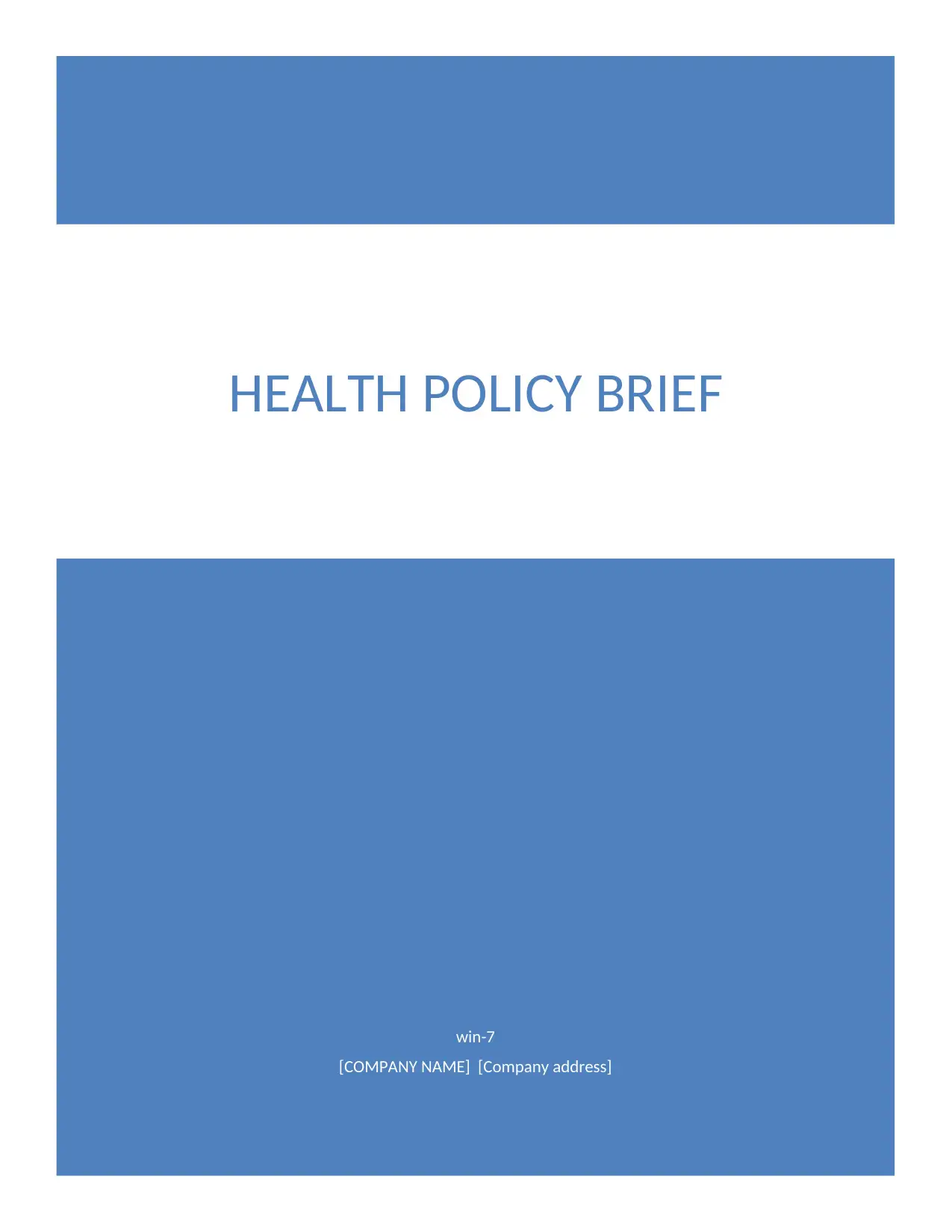
win-7
[COMPANY NAME] [Company address]
HEALTH POLICY BRIEF
[COMPANY NAME] [Company address]
HEALTH POLICY BRIEF
Paraphrase This Document
Need a fresh take? Get an instant paraphrase of this document with our AI Paraphraser
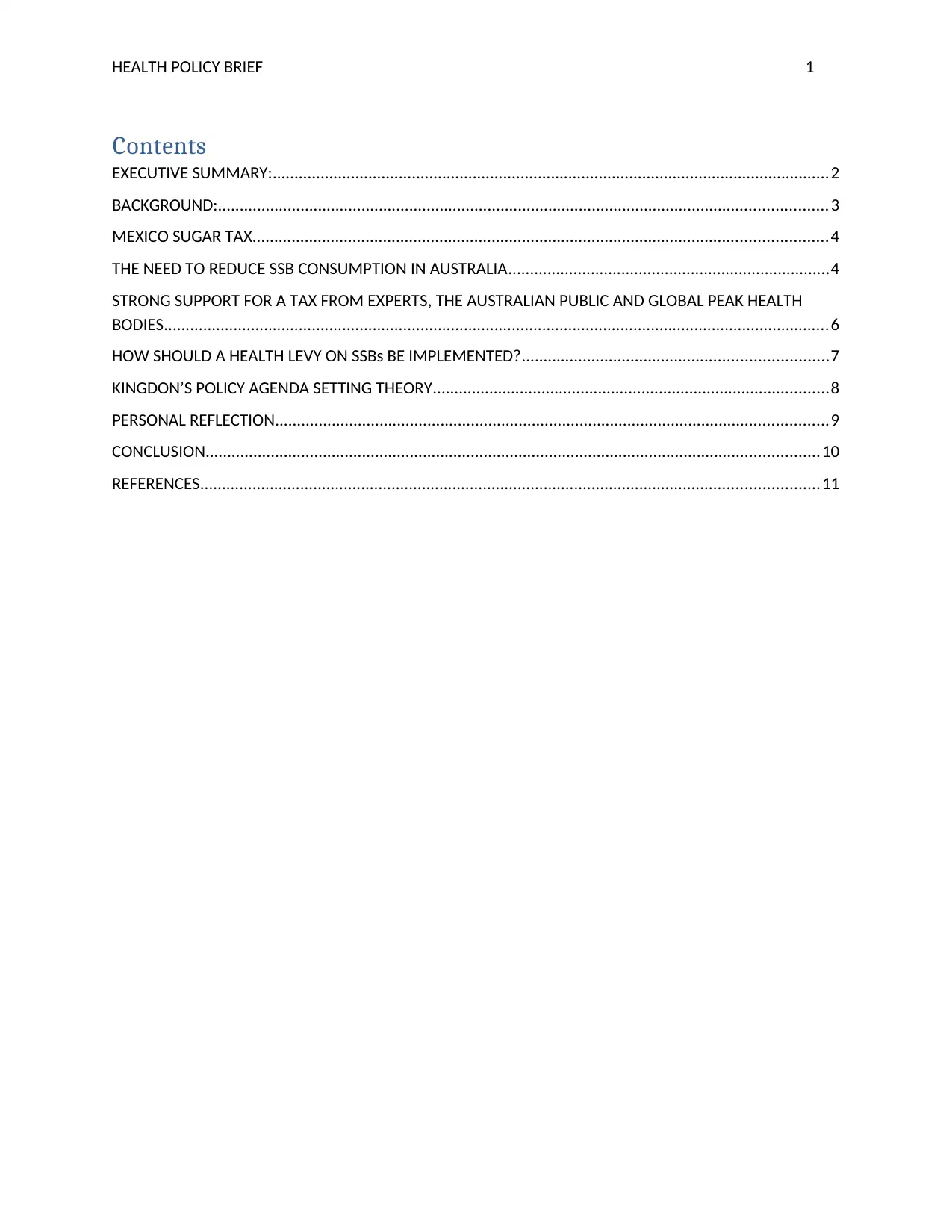
HEALTH POLICY BRIEF 1
Contents
EXECUTIVE SUMMARY:................................................................................................................................2
BACKGROUND:............................................................................................................................................3
MEXICO SUGAR TAX....................................................................................................................................4
THE NEED TO REDUCE SSB CONSUMPTION IN AUSTRALIA..........................................................................4
STRONG SUPPORT FOR A TAX FROM EXPERTS, THE AUSTRALIAN PUBLIC AND GLOBAL PEAK HEALTH
BODIES.........................................................................................................................................................6
HOW SHOULD A HEALTH LEVY ON SSBs BE IMPLEMENTED?......................................................................7
KINGDON’S POLICY AGENDA SETTING THEORY...........................................................................................8
PERSONAL REFLECTION...............................................................................................................................9
CONCLUSION.............................................................................................................................................10
REFERENCES..............................................................................................................................................11
Contents
EXECUTIVE SUMMARY:................................................................................................................................2
BACKGROUND:............................................................................................................................................3
MEXICO SUGAR TAX....................................................................................................................................4
THE NEED TO REDUCE SSB CONSUMPTION IN AUSTRALIA..........................................................................4
STRONG SUPPORT FOR A TAX FROM EXPERTS, THE AUSTRALIAN PUBLIC AND GLOBAL PEAK HEALTH
BODIES.........................................................................................................................................................6
HOW SHOULD A HEALTH LEVY ON SSBs BE IMPLEMENTED?......................................................................7
KINGDON’S POLICY AGENDA SETTING THEORY...........................................................................................8
PERSONAL REFLECTION...............................................................................................................................9
CONCLUSION.............................................................................................................................................10
REFERENCES..............................................................................................................................................11
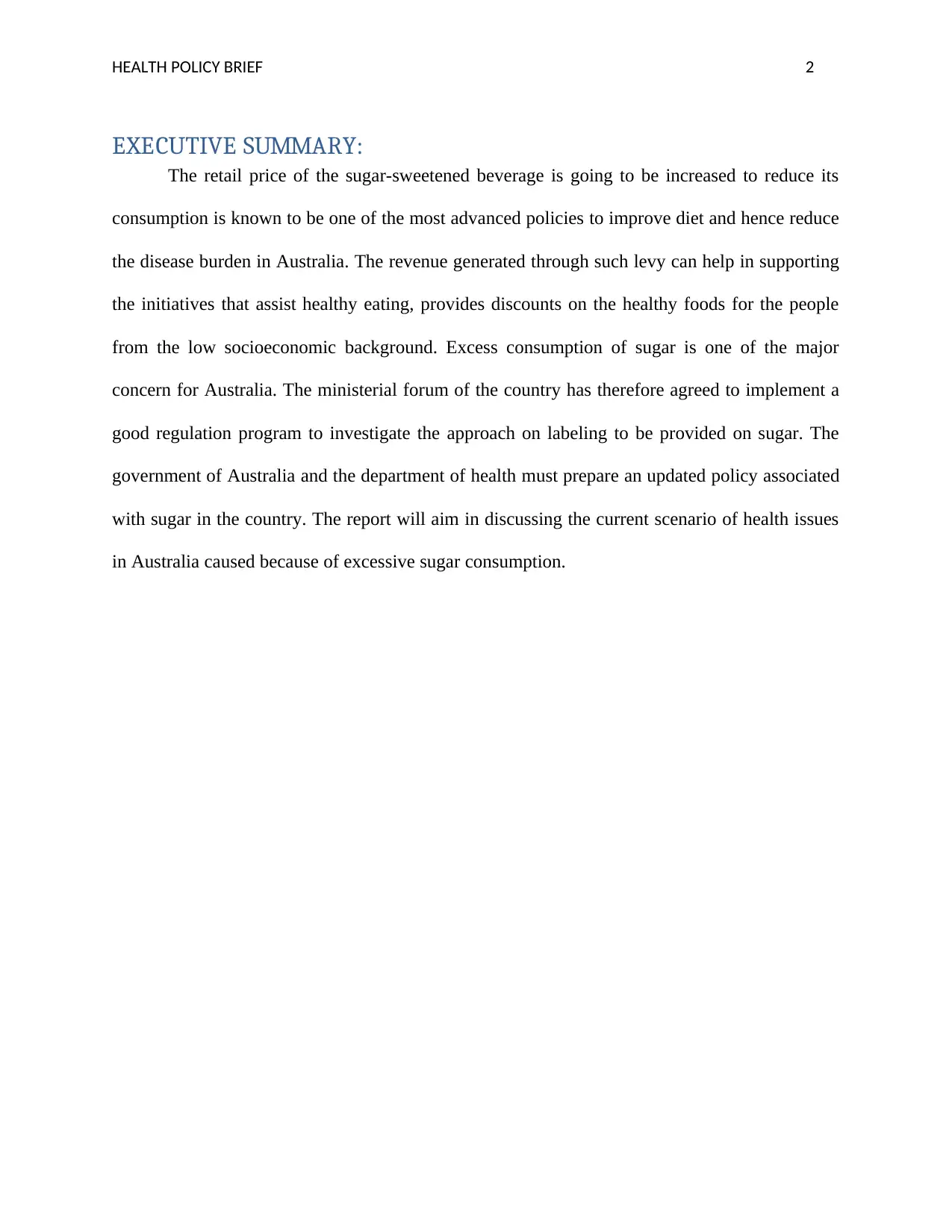
HEALTH POLICY BRIEF 2
EXECUTIVE SUMMARY:
The retail price of the sugar-sweetened beverage is going to be increased to reduce its
consumption is known to be one of the most advanced policies to improve diet and hence reduce
the disease burden in Australia. The revenue generated through such levy can help in supporting
the initiatives that assist healthy eating, provides discounts on the healthy foods for the people
from the low socioeconomic background. Excess consumption of sugar is one of the major
concern for Australia. The ministerial forum of the country has therefore agreed to implement a
good regulation program to investigate the approach on labeling to be provided on sugar. The
government of Australia and the department of health must prepare an updated policy associated
with sugar in the country. The report will aim in discussing the current scenario of health issues
in Australia caused because of excessive sugar consumption.
EXECUTIVE SUMMARY:
The retail price of the sugar-sweetened beverage is going to be increased to reduce its
consumption is known to be one of the most advanced policies to improve diet and hence reduce
the disease burden in Australia. The revenue generated through such levy can help in supporting
the initiatives that assist healthy eating, provides discounts on the healthy foods for the people
from the low socioeconomic background. Excess consumption of sugar is one of the major
concern for Australia. The ministerial forum of the country has therefore agreed to implement a
good regulation program to investigate the approach on labeling to be provided on sugar. The
government of Australia and the department of health must prepare an updated policy associated
with sugar in the country. The report will aim in discussing the current scenario of health issues
in Australia caused because of excessive sugar consumption.
⊘ This is a preview!⊘
Do you want full access?
Subscribe today to unlock all pages.

Trusted by 1+ million students worldwide
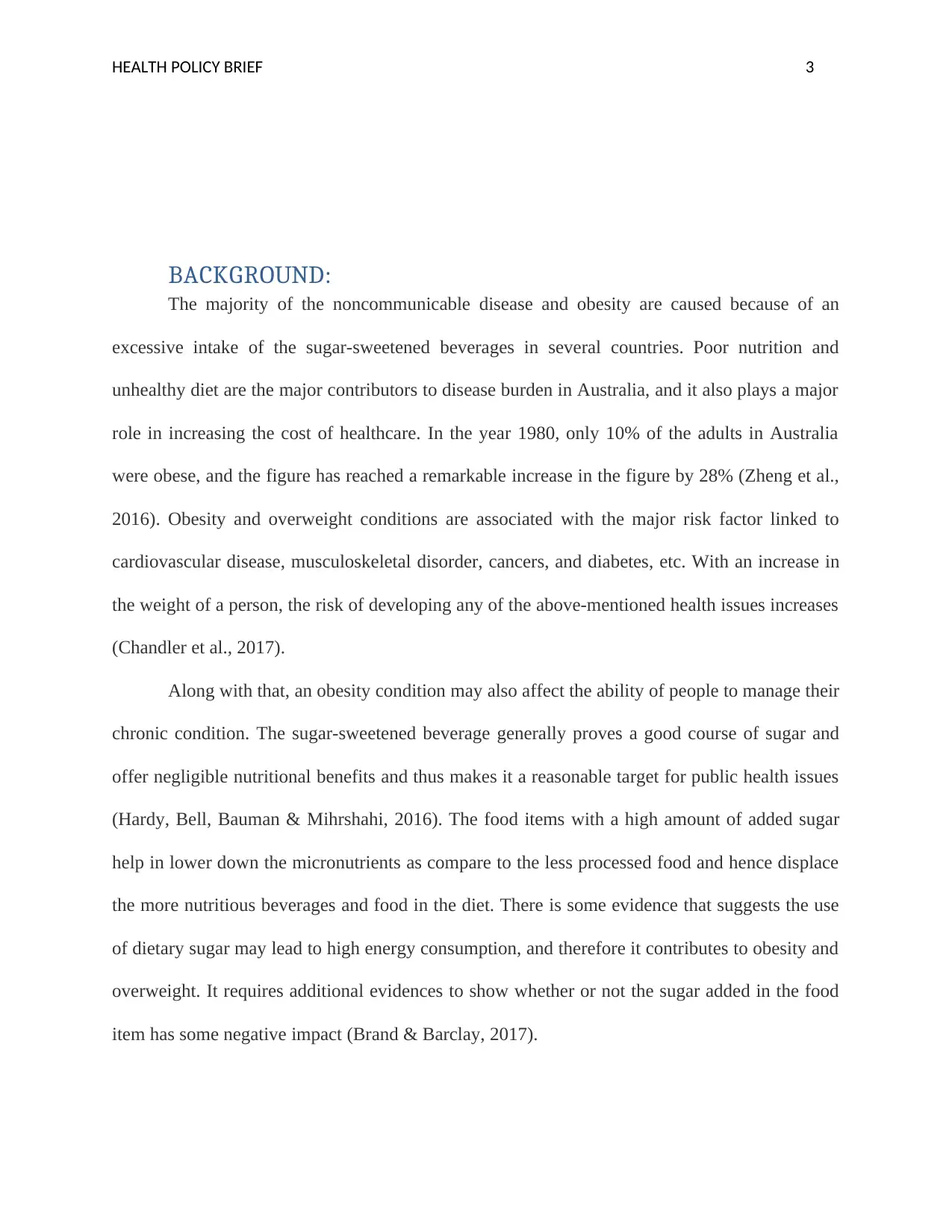
HEALTH POLICY BRIEF 3
BACKGROUND:
The majority of the noncommunicable disease and obesity are caused because of an
excessive intake of the sugar-sweetened beverages in several countries. Poor nutrition and
unhealthy diet are the major contributors to disease burden in Australia, and it also plays a major
role in increasing the cost of healthcare. In the year 1980, only 10% of the adults in Australia
were obese, and the figure has reached a remarkable increase in the figure by 28% (Zheng et al.,
2016). Obesity and overweight conditions are associated with the major risk factor linked to
cardiovascular disease, musculoskeletal disorder, cancers, and diabetes, etc. With an increase in
the weight of a person, the risk of developing any of the above-mentioned health issues increases
(Chandler et al., 2017).
Along with that, an obesity condition may also affect the ability of people to manage their
chronic condition. The sugar-sweetened beverage generally proves a good course of sugar and
offer negligible nutritional benefits and thus makes it a reasonable target for public health issues
(Hardy, Bell, Bauman & Mihrshahi, 2016). The food items with a high amount of added sugar
help in lower down the micronutrients as compare to the less processed food and hence displace
the more nutritious beverages and food in the diet. There is some evidence that suggests the use
of dietary sugar may lead to high energy consumption, and therefore it contributes to obesity and
overweight. It requires additional evidences to show whether or not the sugar added in the food
item has some negative impact (Brand & Barclay, 2017).
BACKGROUND:
The majority of the noncommunicable disease and obesity are caused because of an
excessive intake of the sugar-sweetened beverages in several countries. Poor nutrition and
unhealthy diet are the major contributors to disease burden in Australia, and it also plays a major
role in increasing the cost of healthcare. In the year 1980, only 10% of the adults in Australia
were obese, and the figure has reached a remarkable increase in the figure by 28% (Zheng et al.,
2016). Obesity and overweight conditions are associated with the major risk factor linked to
cardiovascular disease, musculoskeletal disorder, cancers, and diabetes, etc. With an increase in
the weight of a person, the risk of developing any of the above-mentioned health issues increases
(Chandler et al., 2017).
Along with that, an obesity condition may also affect the ability of people to manage their
chronic condition. The sugar-sweetened beverage generally proves a good course of sugar and
offer negligible nutritional benefits and thus makes it a reasonable target for public health issues
(Hardy, Bell, Bauman & Mihrshahi, 2016). The food items with a high amount of added sugar
help in lower down the micronutrients as compare to the less processed food and hence displace
the more nutritious beverages and food in the diet. There is some evidence that suggests the use
of dietary sugar may lead to high energy consumption, and therefore it contributes to obesity and
overweight. It requires additional evidences to show whether or not the sugar added in the food
item has some negative impact (Brand & Barclay, 2017).
Paraphrase This Document
Need a fresh take? Get an instant paraphrase of this document with our AI Paraphraser
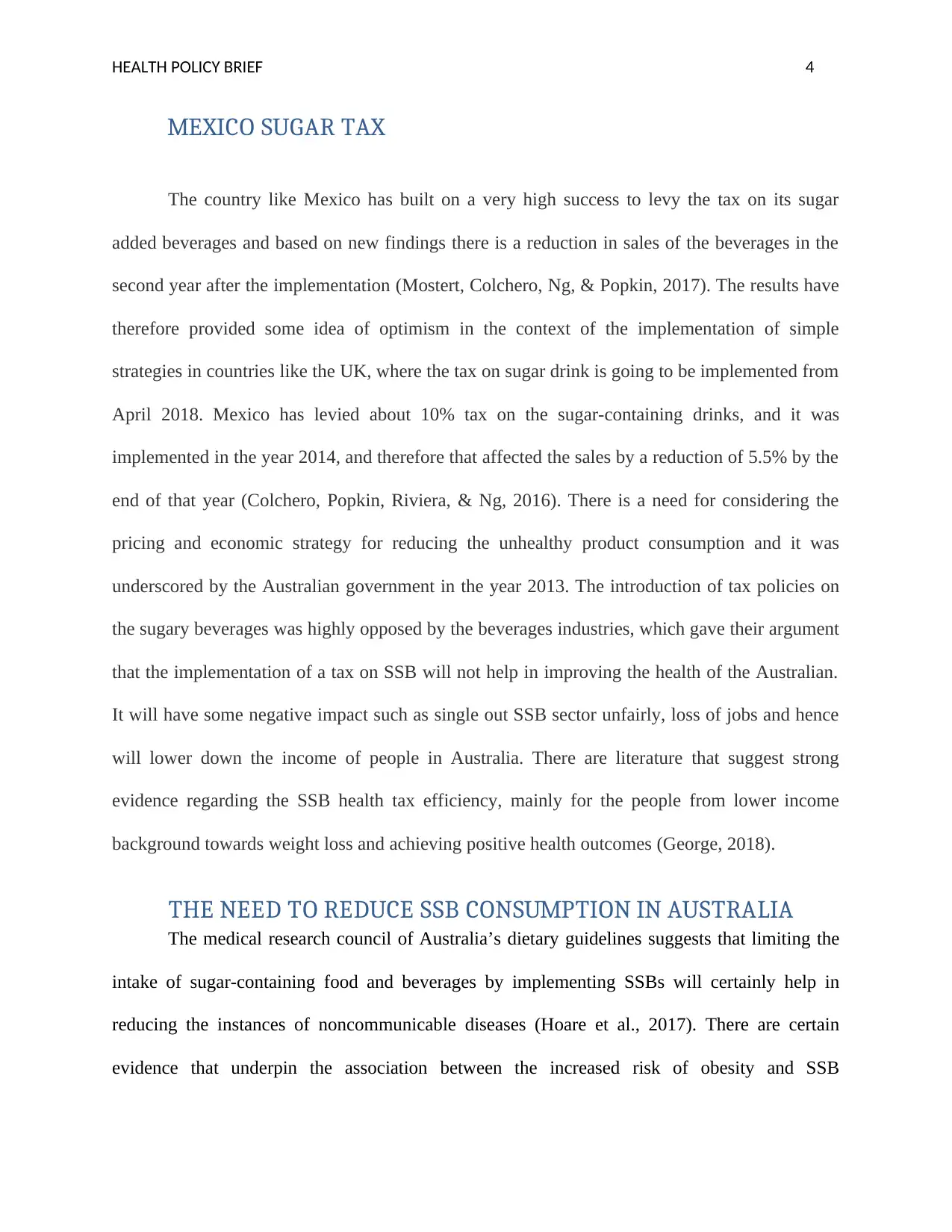
HEALTH POLICY BRIEF 4
MEXICO SUGAR TAX
The country like Mexico has built on a very high success to levy the tax on its sugar
added beverages and based on new findings there is a reduction in sales of the beverages in the
second year after the implementation (Mostert, Colchero, Ng, & Popkin, 2017). The results have
therefore provided some idea of optimism in the context of the implementation of simple
strategies in countries like the UK, where the tax on sugar drink is going to be implemented from
April 2018. Mexico has levied about 10% tax on the sugar-containing drinks, and it was
implemented in the year 2014, and therefore that affected the sales by a reduction of 5.5% by the
end of that year (Colchero, Popkin, Riviera, & Ng, 2016). There is a need for considering the
pricing and economic strategy for reducing the unhealthy product consumption and it was
underscored by the Australian government in the year 2013. The introduction of tax policies on
the sugary beverages was highly opposed by the beverages industries, which gave their argument
that the implementation of a tax on SSB will not help in improving the health of the Australian.
It will have some negative impact such as single out SSB sector unfairly, loss of jobs and hence
will lower down the income of people in Australia. There are literature that suggest strong
evidence regarding the SSB health tax efficiency, mainly for the people from lower income
background towards weight loss and achieving positive health outcomes (George, 2018).
THE NEED TO REDUCE SSB CONSUMPTION IN AUSTRALIA
The medical research council of Australia’s dietary guidelines suggests that limiting the
intake of sugar-containing food and beverages by implementing SSBs will certainly help in
reducing the instances of noncommunicable diseases (Hoare et al., 2017). There are certain
evidence that underpin the association between the increased risk of obesity and SSB
MEXICO SUGAR TAX
The country like Mexico has built on a very high success to levy the tax on its sugar
added beverages and based on new findings there is a reduction in sales of the beverages in the
second year after the implementation (Mostert, Colchero, Ng, & Popkin, 2017). The results have
therefore provided some idea of optimism in the context of the implementation of simple
strategies in countries like the UK, where the tax on sugar drink is going to be implemented from
April 2018. Mexico has levied about 10% tax on the sugar-containing drinks, and it was
implemented in the year 2014, and therefore that affected the sales by a reduction of 5.5% by the
end of that year (Colchero, Popkin, Riviera, & Ng, 2016). There is a need for considering the
pricing and economic strategy for reducing the unhealthy product consumption and it was
underscored by the Australian government in the year 2013. The introduction of tax policies on
the sugary beverages was highly opposed by the beverages industries, which gave their argument
that the implementation of a tax on SSB will not help in improving the health of the Australian.
It will have some negative impact such as single out SSB sector unfairly, loss of jobs and hence
will lower down the income of people in Australia. There are literature that suggest strong
evidence regarding the SSB health tax efficiency, mainly for the people from lower income
background towards weight loss and achieving positive health outcomes (George, 2018).
THE NEED TO REDUCE SSB CONSUMPTION IN AUSTRALIA
The medical research council of Australia’s dietary guidelines suggests that limiting the
intake of sugar-containing food and beverages by implementing SSBs will certainly help in
reducing the instances of noncommunicable diseases (Hoare et al., 2017). There are certain
evidence that underpin the association between the increased risk of obesity and SSB
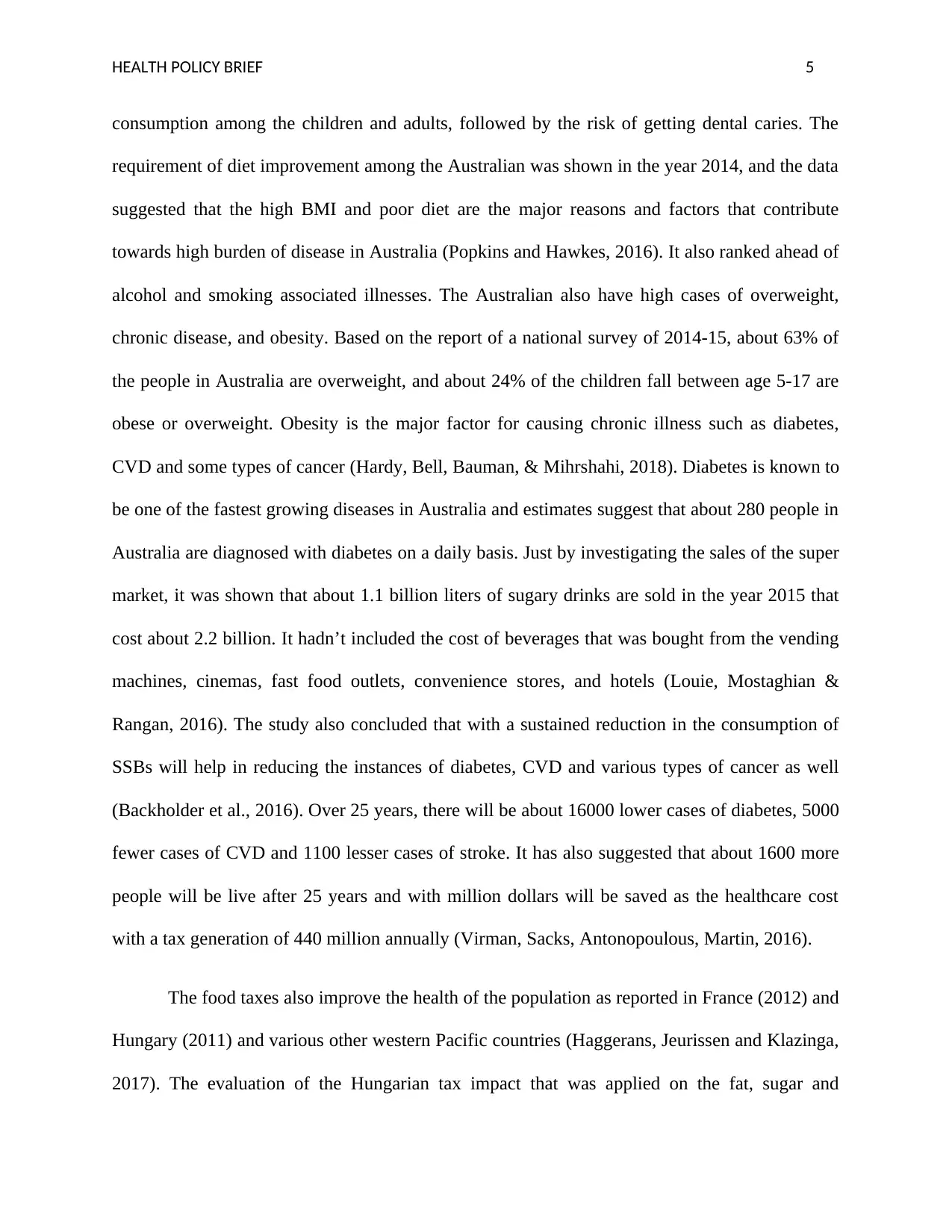
HEALTH POLICY BRIEF 5
consumption among the children and adults, followed by the risk of getting dental caries. The
requirement of diet improvement among the Australian was shown in the year 2014, and the data
suggested that the high BMI and poor diet are the major reasons and factors that contribute
towards high burden of disease in Australia (Popkins and Hawkes, 2016). It also ranked ahead of
alcohol and smoking associated illnesses. The Australian also have high cases of overweight,
chronic disease, and obesity. Based on the report of a national survey of 2014-15, about 63% of
the people in Australia are overweight, and about 24% of the children fall between age 5-17 are
obese or overweight. Obesity is the major factor for causing chronic illness such as diabetes,
CVD and some types of cancer (Hardy, Bell, Bauman, & Mihrshahi, 2018). Diabetes is known to
be one of the fastest growing diseases in Australia and estimates suggest that about 280 people in
Australia are diagnosed with diabetes on a daily basis. Just by investigating the sales of the super
market, it was shown that about 1.1 billion liters of sugary drinks are sold in the year 2015 that
cost about 2.2 billion. It hadn’t included the cost of beverages that was bought from the vending
machines, cinemas, fast food outlets, convenience stores, and hotels (Louie, Mostaghian &
Rangan, 2016). The study also concluded that with a sustained reduction in the consumption of
SSBs will help in reducing the instances of diabetes, CVD and various types of cancer as well
(Backholder et al., 2016). Over 25 years, there will be about 16000 lower cases of diabetes, 5000
fewer cases of CVD and 1100 lesser cases of stroke. It has also suggested that about 1600 more
people will be live after 25 years and with million dollars will be saved as the healthcare cost
with a tax generation of 440 million annually (Virman, Sacks, Antonopoulous, Martin, 2016).
The food taxes also improve the health of the population as reported in France (2012) and
Hungary (2011) and various other western Pacific countries (Haggerans, Jeurissen and Klazinga,
2017). The evaluation of the Hungarian tax impact that was applied on the fat, sugar and
consumption among the children and adults, followed by the risk of getting dental caries. The
requirement of diet improvement among the Australian was shown in the year 2014, and the data
suggested that the high BMI and poor diet are the major reasons and factors that contribute
towards high burden of disease in Australia (Popkins and Hawkes, 2016). It also ranked ahead of
alcohol and smoking associated illnesses. The Australian also have high cases of overweight,
chronic disease, and obesity. Based on the report of a national survey of 2014-15, about 63% of
the people in Australia are overweight, and about 24% of the children fall between age 5-17 are
obese or overweight. Obesity is the major factor for causing chronic illness such as diabetes,
CVD and some types of cancer (Hardy, Bell, Bauman, & Mihrshahi, 2018). Diabetes is known to
be one of the fastest growing diseases in Australia and estimates suggest that about 280 people in
Australia are diagnosed with diabetes on a daily basis. Just by investigating the sales of the super
market, it was shown that about 1.1 billion liters of sugary drinks are sold in the year 2015 that
cost about 2.2 billion. It hadn’t included the cost of beverages that was bought from the vending
machines, cinemas, fast food outlets, convenience stores, and hotels (Louie, Mostaghian &
Rangan, 2016). The study also concluded that with a sustained reduction in the consumption of
SSBs will help in reducing the instances of diabetes, CVD and various types of cancer as well
(Backholder et al., 2016). Over 25 years, there will be about 16000 lower cases of diabetes, 5000
fewer cases of CVD and 1100 lesser cases of stroke. It has also suggested that about 1600 more
people will be live after 25 years and with million dollars will be saved as the healthcare cost
with a tax generation of 440 million annually (Virman, Sacks, Antonopoulous, Martin, 2016).
The food taxes also improve the health of the population as reported in France (2012) and
Hungary (2011) and various other western Pacific countries (Haggerans, Jeurissen and Klazinga,
2017). The evaluation of the Hungarian tax impact that was applied on the fat, sugar and
⊘ This is a preview!⊘
Do you want full access?
Subscribe today to unlock all pages.

Trusted by 1+ million students worldwide
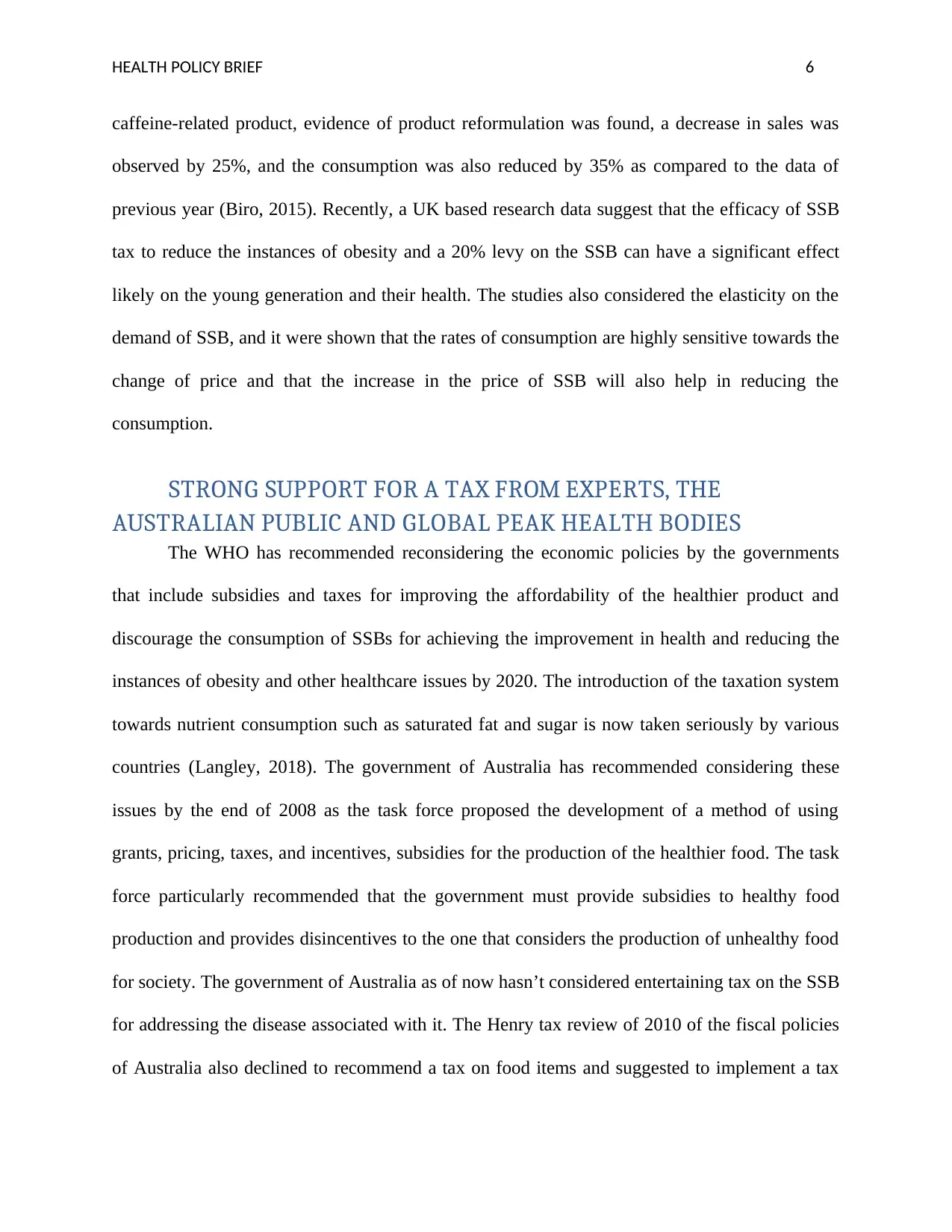
HEALTH POLICY BRIEF 6
caffeine-related product, evidence of product reformulation was found, a decrease in sales was
observed by 25%, and the consumption was also reduced by 35% as compared to the data of
previous year (Biro, 2015). Recently, a UK based research data suggest that the efficacy of SSB
tax to reduce the instances of obesity and a 20% levy on the SSB can have a significant effect
likely on the young generation and their health. The studies also considered the elasticity on the
demand of SSB, and it were shown that the rates of consumption are highly sensitive towards the
change of price and that the increase in the price of SSB will also help in reducing the
consumption.
STRONG SUPPORT FOR A TAX FROM EXPERTS, THE
AUSTRALIAN PUBLIC AND GLOBAL PEAK HEALTH BODIES
The WHO has recommended reconsidering the economic policies by the governments
that include subsidies and taxes for improving the affordability of the healthier product and
discourage the consumption of SSBs for achieving the improvement in health and reducing the
instances of obesity and other healthcare issues by 2020. The introduction of the taxation system
towards nutrient consumption such as saturated fat and sugar is now taken seriously by various
countries (Langley, 2018). The government of Australia has recommended considering these
issues by the end of 2008 as the task force proposed the development of a method of using
grants, pricing, taxes, and incentives, subsidies for the production of the healthier food. The task
force particularly recommended that the government must provide subsidies to healthy food
production and provides disincentives to the one that considers the production of unhealthy food
for society. The government of Australia as of now hasn’t considered entertaining tax on the SSB
for addressing the disease associated with it. The Henry tax review of 2010 of the fiscal policies
of Australia also declined to recommend a tax on food items and suggested to implement a tax
caffeine-related product, evidence of product reformulation was found, a decrease in sales was
observed by 25%, and the consumption was also reduced by 35% as compared to the data of
previous year (Biro, 2015). Recently, a UK based research data suggest that the efficacy of SSB
tax to reduce the instances of obesity and a 20% levy on the SSB can have a significant effect
likely on the young generation and their health. The studies also considered the elasticity on the
demand of SSB, and it were shown that the rates of consumption are highly sensitive towards the
change of price and that the increase in the price of SSB will also help in reducing the
consumption.
STRONG SUPPORT FOR A TAX FROM EXPERTS, THE
AUSTRALIAN PUBLIC AND GLOBAL PEAK HEALTH BODIES
The WHO has recommended reconsidering the economic policies by the governments
that include subsidies and taxes for improving the affordability of the healthier product and
discourage the consumption of SSBs for achieving the improvement in health and reducing the
instances of obesity and other healthcare issues by 2020. The introduction of the taxation system
towards nutrient consumption such as saturated fat and sugar is now taken seriously by various
countries (Langley, 2018). The government of Australia has recommended considering these
issues by the end of 2008 as the task force proposed the development of a method of using
grants, pricing, taxes, and incentives, subsidies for the production of the healthier food. The task
force particularly recommended that the government must provide subsidies to healthy food
production and provides disincentives to the one that considers the production of unhealthy food
for society. The government of Australia as of now hasn’t considered entertaining tax on the SSB
for addressing the disease associated with it. The Henry tax review of 2010 of the fiscal policies
of Australia also declined to recommend a tax on food items and suggested to implement a tax
Paraphrase This Document
Need a fresh take? Get an instant paraphrase of this document with our AI Paraphraser
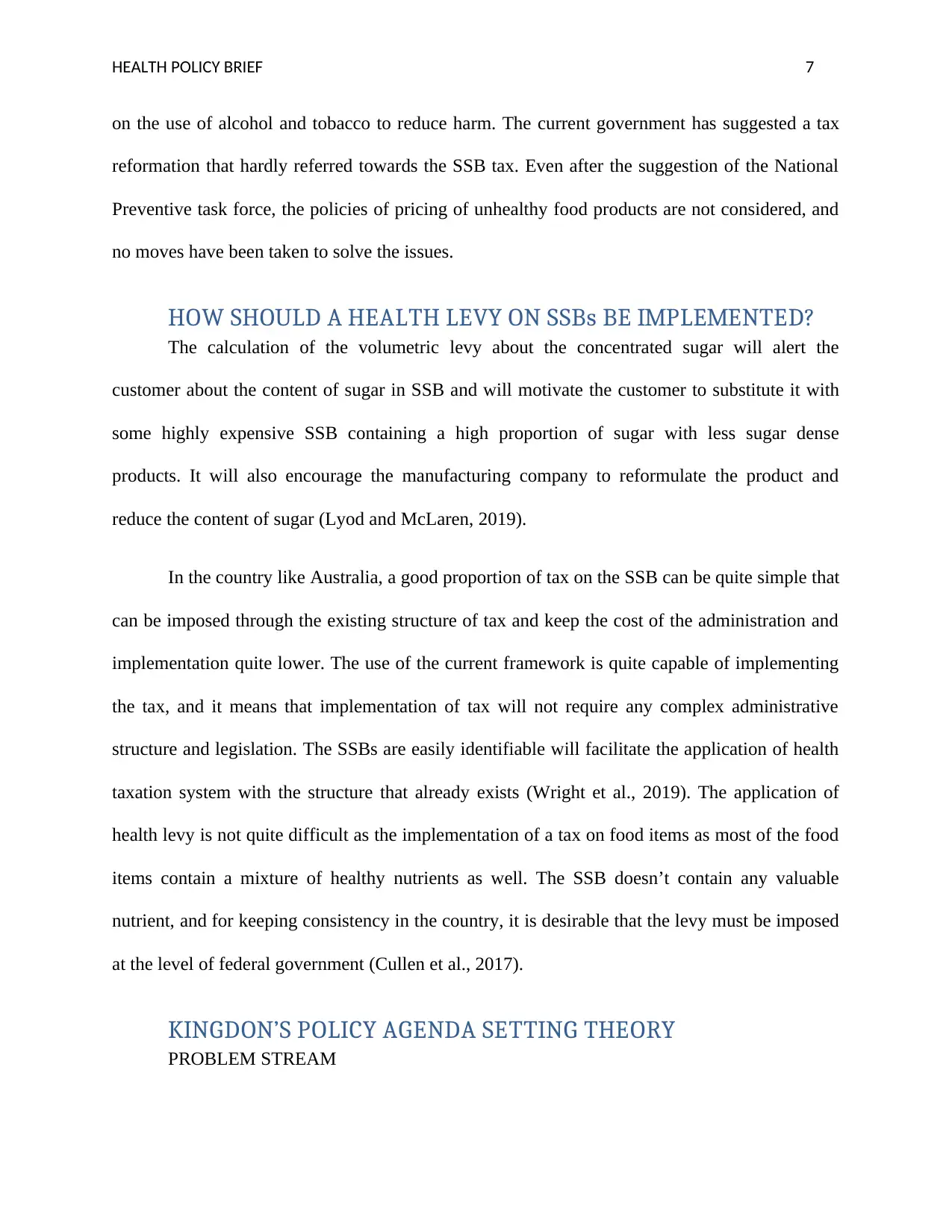
HEALTH POLICY BRIEF 7
on the use of alcohol and tobacco to reduce harm. The current government has suggested a tax
reformation that hardly referred towards the SSB tax. Even after the suggestion of the National
Preventive task force, the policies of pricing of unhealthy food products are not considered, and
no moves have been taken to solve the issues.
HOW SHOULD A HEALTH LEVY ON SSBs BE IMPLEMENTED?
The calculation of the volumetric levy about the concentrated sugar will alert the
customer about the content of sugar in SSB and will motivate the customer to substitute it with
some highly expensive SSB containing a high proportion of sugar with less sugar dense
products. It will also encourage the manufacturing company to reformulate the product and
reduce the content of sugar (Lyod and McLaren, 2019).
In the country like Australia, a good proportion of tax on the SSB can be quite simple that
can be imposed through the existing structure of tax and keep the cost of the administration and
implementation quite lower. The use of the current framework is quite capable of implementing
the tax, and it means that implementation of tax will not require any complex administrative
structure and legislation. The SSBs are easily identifiable will facilitate the application of health
taxation system with the structure that already exists (Wright et al., 2019). The application of
health levy is not quite difficult as the implementation of a tax on food items as most of the food
items contain a mixture of healthy nutrients as well. The SSB doesn’t contain any valuable
nutrient, and for keeping consistency in the country, it is desirable that the levy must be imposed
at the level of federal government (Cullen et al., 2017).
KINGDON’S POLICY AGENDA SETTING THEORY
PROBLEM STREAM
on the use of alcohol and tobacco to reduce harm. The current government has suggested a tax
reformation that hardly referred towards the SSB tax. Even after the suggestion of the National
Preventive task force, the policies of pricing of unhealthy food products are not considered, and
no moves have been taken to solve the issues.
HOW SHOULD A HEALTH LEVY ON SSBs BE IMPLEMENTED?
The calculation of the volumetric levy about the concentrated sugar will alert the
customer about the content of sugar in SSB and will motivate the customer to substitute it with
some highly expensive SSB containing a high proportion of sugar with less sugar dense
products. It will also encourage the manufacturing company to reformulate the product and
reduce the content of sugar (Lyod and McLaren, 2019).
In the country like Australia, a good proportion of tax on the SSB can be quite simple that
can be imposed through the existing structure of tax and keep the cost of the administration and
implementation quite lower. The use of the current framework is quite capable of implementing
the tax, and it means that implementation of tax will not require any complex administrative
structure and legislation. The SSBs are easily identifiable will facilitate the application of health
taxation system with the structure that already exists (Wright et al., 2019). The application of
health levy is not quite difficult as the implementation of a tax on food items as most of the food
items contain a mixture of healthy nutrients as well. The SSB doesn’t contain any valuable
nutrient, and for keeping consistency in the country, it is desirable that the levy must be imposed
at the level of federal government (Cullen et al., 2017).
KINGDON’S POLICY AGENDA SETTING THEORY
PROBLEM STREAM
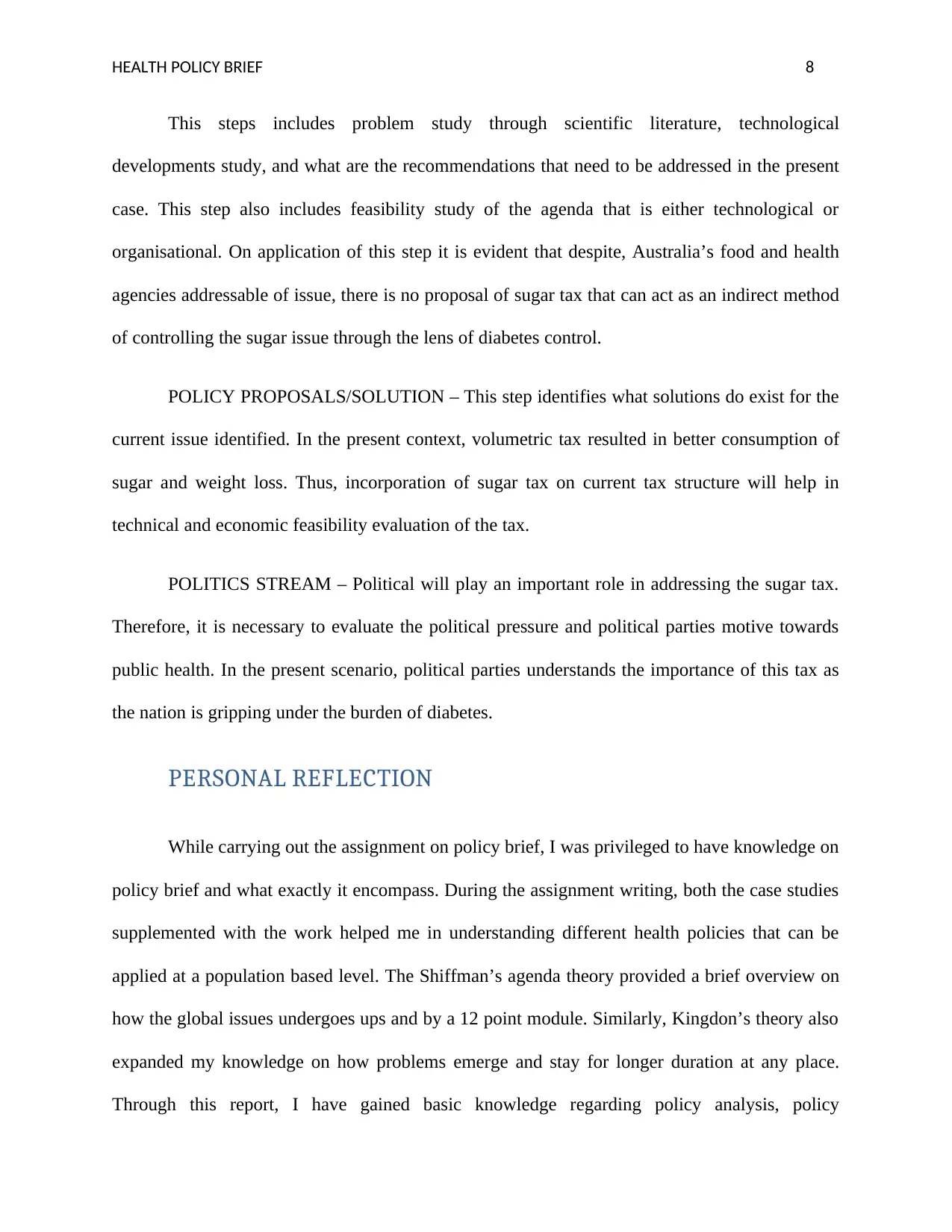
HEALTH POLICY BRIEF 8
This steps includes problem study through scientific literature, technological
developments study, and what are the recommendations that need to be addressed in the present
case. This step also includes feasibility study of the agenda that is either technological or
organisational. On application of this step it is evident that despite, Australia’s food and health
agencies addressable of issue, there is no proposal of sugar tax that can act as an indirect method
of controlling the sugar issue through the lens of diabetes control.
POLICY PROPOSALS/SOLUTION – This step identifies what solutions do exist for the
current issue identified. In the present context, volumetric tax resulted in better consumption of
sugar and weight loss. Thus, incorporation of sugar tax on current tax structure will help in
technical and economic feasibility evaluation of the tax.
POLITICS STREAM – Political will play an important role in addressing the sugar tax.
Therefore, it is necessary to evaluate the political pressure and political parties motive towards
public health. In the present scenario, political parties understands the importance of this tax as
the nation is gripping under the burden of diabetes.
PERSONAL REFLECTION
While carrying out the assignment on policy brief, I was privileged to have knowledge on
policy brief and what exactly it encompass. During the assignment writing, both the case studies
supplemented with the work helped me in understanding different health policies that can be
applied at a population based level. The Shiffman’s agenda theory provided a brief overview on
how the global issues undergoes ups and by a 12 point module. Similarly, Kingdon’s theory also
expanded my knowledge on how problems emerge and stay for longer duration at any place.
Through this report, I have gained basic knowledge regarding policy analysis, policy
This steps includes problem study through scientific literature, technological
developments study, and what are the recommendations that need to be addressed in the present
case. This step also includes feasibility study of the agenda that is either technological or
organisational. On application of this step it is evident that despite, Australia’s food and health
agencies addressable of issue, there is no proposal of sugar tax that can act as an indirect method
of controlling the sugar issue through the lens of diabetes control.
POLICY PROPOSALS/SOLUTION – This step identifies what solutions do exist for the
current issue identified. In the present context, volumetric tax resulted in better consumption of
sugar and weight loss. Thus, incorporation of sugar tax on current tax structure will help in
technical and economic feasibility evaluation of the tax.
POLITICS STREAM – Political will play an important role in addressing the sugar tax.
Therefore, it is necessary to evaluate the political pressure and political parties motive towards
public health. In the present scenario, political parties understands the importance of this tax as
the nation is gripping under the burden of diabetes.
PERSONAL REFLECTION
While carrying out the assignment on policy brief, I was privileged to have knowledge on
policy brief and what exactly it encompass. During the assignment writing, both the case studies
supplemented with the work helped me in understanding different health policies that can be
applied at a population based level. The Shiffman’s agenda theory provided a brief overview on
how the global issues undergoes ups and by a 12 point module. Similarly, Kingdon’s theory also
expanded my knowledge on how problems emerge and stay for longer duration at any place.
Through this report, I have gained basic knowledge regarding policy analysis, policy
⊘ This is a preview!⊘
Do you want full access?
Subscribe today to unlock all pages.

Trusted by 1+ million students worldwide
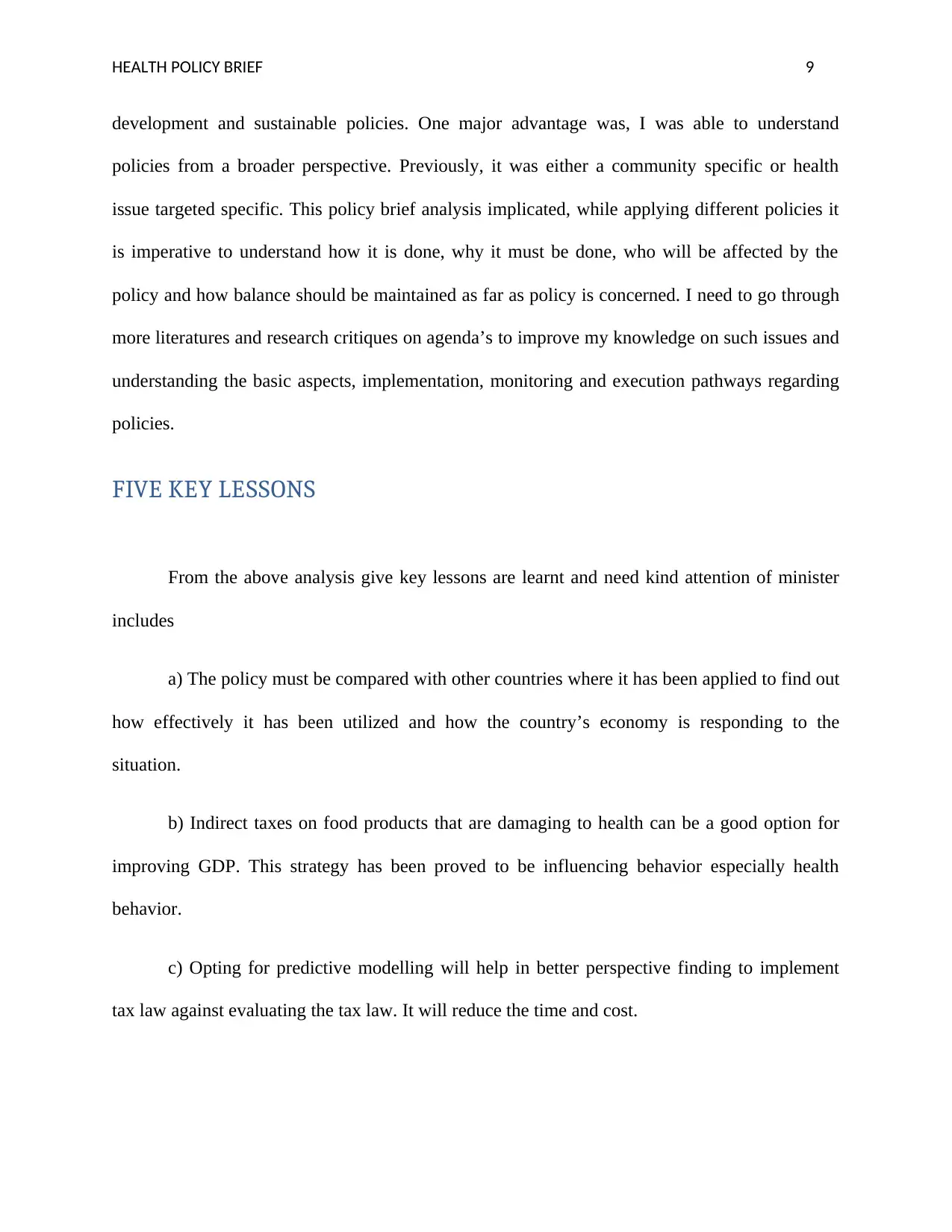
HEALTH POLICY BRIEF 9
development and sustainable policies. One major advantage was, I was able to understand
policies from a broader perspective. Previously, it was either a community specific or health
issue targeted specific. This policy brief analysis implicated, while applying different policies it
is imperative to understand how it is done, why it must be done, who will be affected by the
policy and how balance should be maintained as far as policy is concerned. I need to go through
more literatures and research critiques on agenda’s to improve my knowledge on such issues and
understanding the basic aspects, implementation, monitoring and execution pathways regarding
policies.
FIVE KEY LESSONS
From the above analysis give key lessons are learnt and need kind attention of minister
includes
a) The policy must be compared with other countries where it has been applied to find out
how effectively it has been utilized and how the country’s economy is responding to the
situation.
b) Indirect taxes on food products that are damaging to health can be a good option for
improving GDP. This strategy has been proved to be influencing behavior especially health
behavior.
c) Opting for predictive modelling will help in better perspective finding to implement
tax law against evaluating the tax law. It will reduce the time and cost.
development and sustainable policies. One major advantage was, I was able to understand
policies from a broader perspective. Previously, it was either a community specific or health
issue targeted specific. This policy brief analysis implicated, while applying different policies it
is imperative to understand how it is done, why it must be done, who will be affected by the
policy and how balance should be maintained as far as policy is concerned. I need to go through
more literatures and research critiques on agenda’s to improve my knowledge on such issues and
understanding the basic aspects, implementation, monitoring and execution pathways regarding
policies.
FIVE KEY LESSONS
From the above analysis give key lessons are learnt and need kind attention of minister
includes
a) The policy must be compared with other countries where it has been applied to find out
how effectively it has been utilized and how the country’s economy is responding to the
situation.
b) Indirect taxes on food products that are damaging to health can be a good option for
improving GDP. This strategy has been proved to be influencing behavior especially health
behavior.
c) Opting for predictive modelling will help in better perspective finding to implement
tax law against evaluating the tax law. It will reduce the time and cost.
Paraphrase This Document
Need a fresh take? Get an instant paraphrase of this document with our AI Paraphraser
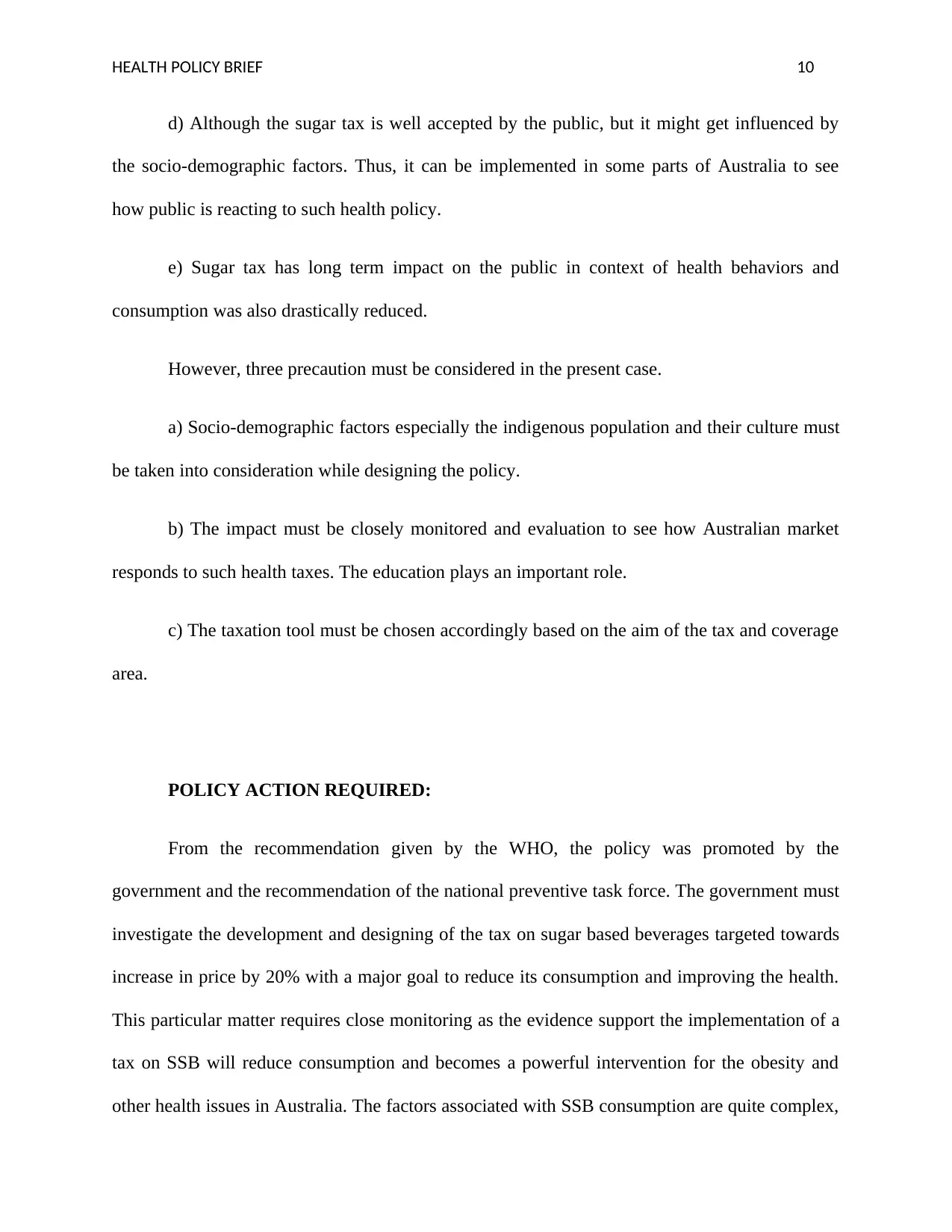
HEALTH POLICY BRIEF 10
d) Although the sugar tax is well accepted by the public, but it might get influenced by
the socio-demographic factors. Thus, it can be implemented in some parts of Australia to see
how public is reacting to such health policy.
e) Sugar tax has long term impact on the public in context of health behaviors and
consumption was also drastically reduced.
However, three precaution must be considered in the present case.
a) Socio-demographic factors especially the indigenous population and their culture must
be taken into consideration while designing the policy.
b) The impact must be closely monitored and evaluation to see how Australian market
responds to such health taxes. The education plays an important role.
c) The taxation tool must be chosen accordingly based on the aim of the tax and coverage
area.
POLICY ACTION REQUIRED:
From the recommendation given by the WHO, the policy was promoted by the
government and the recommendation of the national preventive task force. The government must
investigate the development and designing of the tax on sugar based beverages targeted towards
increase in price by 20% with a major goal to reduce its consumption and improving the health.
This particular matter requires close monitoring as the evidence support the implementation of a
tax on SSB will reduce consumption and becomes a powerful intervention for the obesity and
other health issues in Australia. The factors associated with SSB consumption are quite complex,
d) Although the sugar tax is well accepted by the public, but it might get influenced by
the socio-demographic factors. Thus, it can be implemented in some parts of Australia to see
how public is reacting to such health policy.
e) Sugar tax has long term impact on the public in context of health behaviors and
consumption was also drastically reduced.
However, three precaution must be considered in the present case.
a) Socio-demographic factors especially the indigenous population and their culture must
be taken into consideration while designing the policy.
b) The impact must be closely monitored and evaluation to see how Australian market
responds to such health taxes. The education plays an important role.
c) The taxation tool must be chosen accordingly based on the aim of the tax and coverage
area.
POLICY ACTION REQUIRED:
From the recommendation given by the WHO, the policy was promoted by the
government and the recommendation of the national preventive task force. The government must
investigate the development and designing of the tax on sugar based beverages targeted towards
increase in price by 20% with a major goal to reduce its consumption and improving the health.
This particular matter requires close monitoring as the evidence support the implementation of a
tax on SSB will reduce consumption and becomes a powerful intervention for the obesity and
other health issues in Australia. The factors associated with SSB consumption are quite complex,
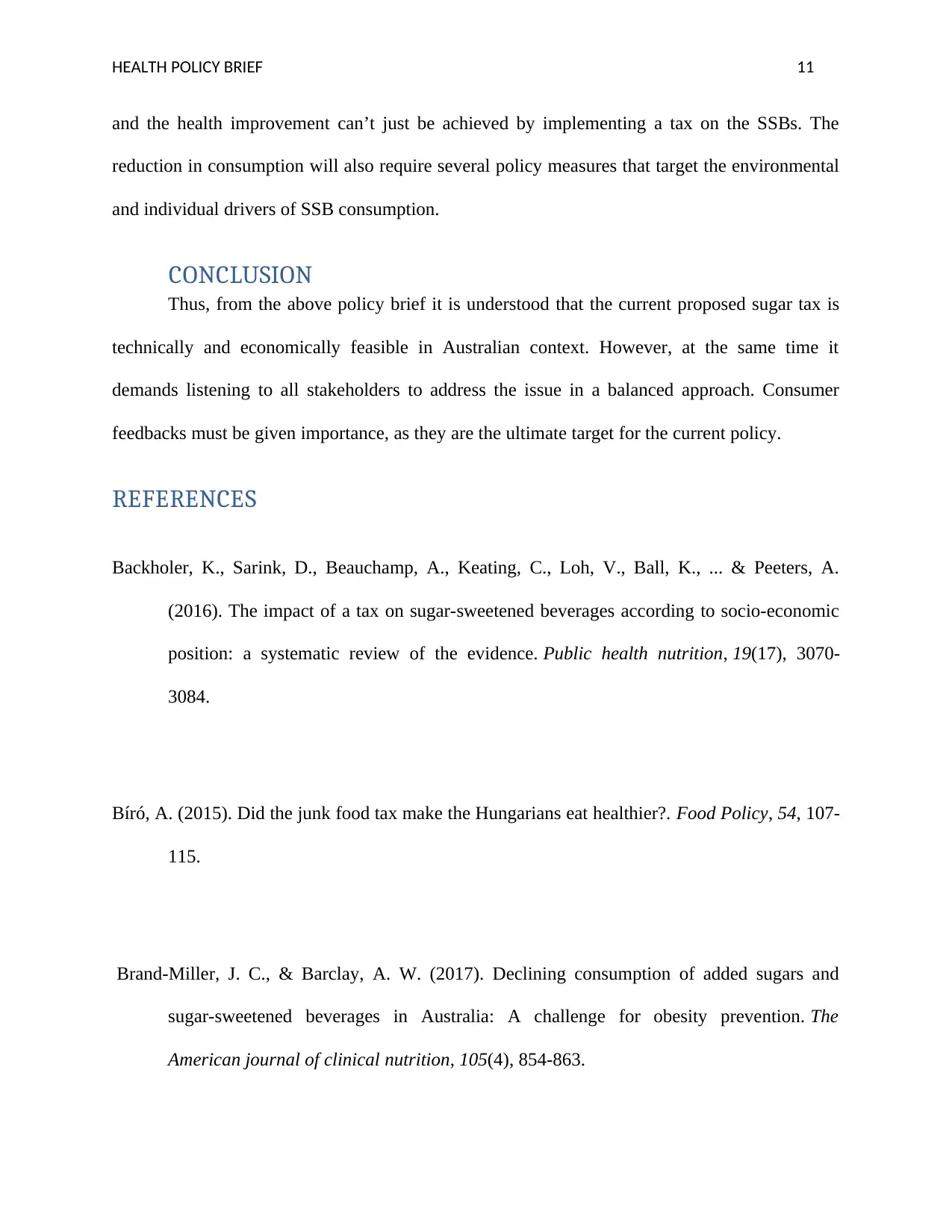
HEALTH POLICY BRIEF 11
and the health improvement can’t just be achieved by implementing a tax on the SSBs. The
reduction in consumption will also require several policy measures that target the environmental
and individual drivers of SSB consumption.
CONCLUSION
Thus, from the above policy brief it is understood that the current proposed sugar tax is
technically and economically feasible in Australian context. However, at the same time it
demands listening to all stakeholders to address the issue in a balanced approach. Consumer
feedbacks must be given importance, as they are the ultimate target for the current policy.
REFERENCES
Backholer, K., Sarink, D., Beauchamp, A., Keating, C., Loh, V., Ball, K., ... & Peeters, A.
(2016). The impact of a tax on sugar-sweetened beverages according to socio-economic
position: a systematic review of the evidence. Public health nutrition, 19(17), 3070-
3084.
Bíró, A. (2015). Did the junk food tax make the Hungarians eat healthier?. Food Policy, 54, 107-
115.
Brand-Miller, J. C., & Barclay, A. W. (2017). Declining consumption of added sugars and
sugar-sweetened beverages in Australia: A challenge for obesity prevention. The
American journal of clinical nutrition, 105(4), 854-863.
and the health improvement can’t just be achieved by implementing a tax on the SSBs. The
reduction in consumption will also require several policy measures that target the environmental
and individual drivers of SSB consumption.
CONCLUSION
Thus, from the above policy brief it is understood that the current proposed sugar tax is
technically and economically feasible in Australian context. However, at the same time it
demands listening to all stakeholders to address the issue in a balanced approach. Consumer
feedbacks must be given importance, as they are the ultimate target for the current policy.
REFERENCES
Backholer, K., Sarink, D., Beauchamp, A., Keating, C., Loh, V., Ball, K., ... & Peeters, A.
(2016). The impact of a tax on sugar-sweetened beverages according to socio-economic
position: a systematic review of the evidence. Public health nutrition, 19(17), 3070-
3084.
Bíró, A. (2015). Did the junk food tax make the Hungarians eat healthier?. Food Policy, 54, 107-
115.
Brand-Miller, J. C., & Barclay, A. W. (2017). Declining consumption of added sugars and
sugar-sweetened beverages in Australia: A challenge for obesity prevention. The
American journal of clinical nutrition, 105(4), 854-863.
⊘ This is a preview!⊘
Do you want full access?
Subscribe today to unlock all pages.

Trusted by 1+ million students worldwide
1 out of 16
Related Documents
Your All-in-One AI-Powered Toolkit for Academic Success.
+13062052269
info@desklib.com
Available 24*7 on WhatsApp / Email
![[object Object]](/_next/static/media/star-bottom.7253800d.svg)
Unlock your academic potential
Copyright © 2020–2026 A2Z Services. All Rights Reserved. Developed and managed by ZUCOL.





